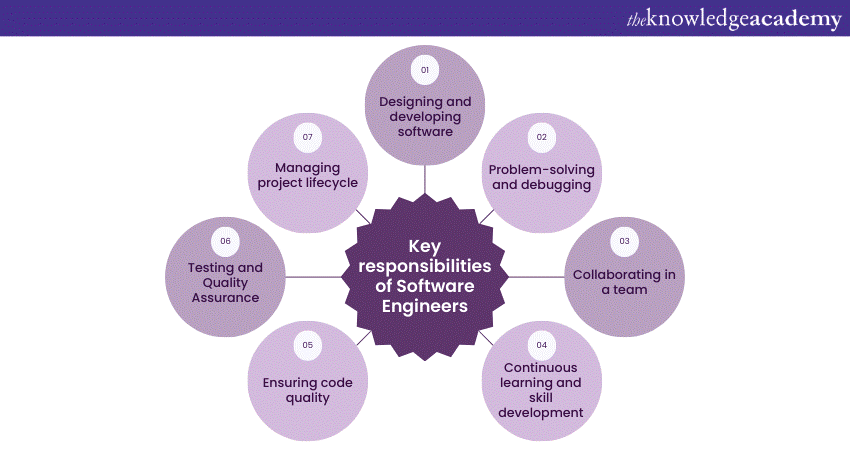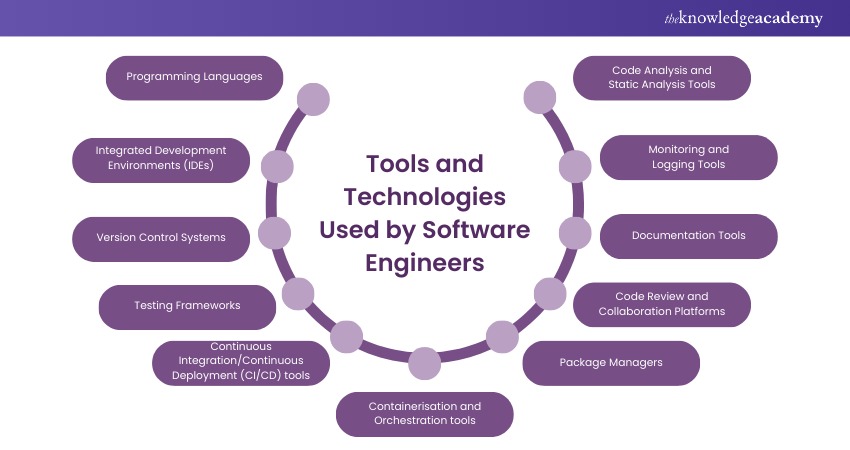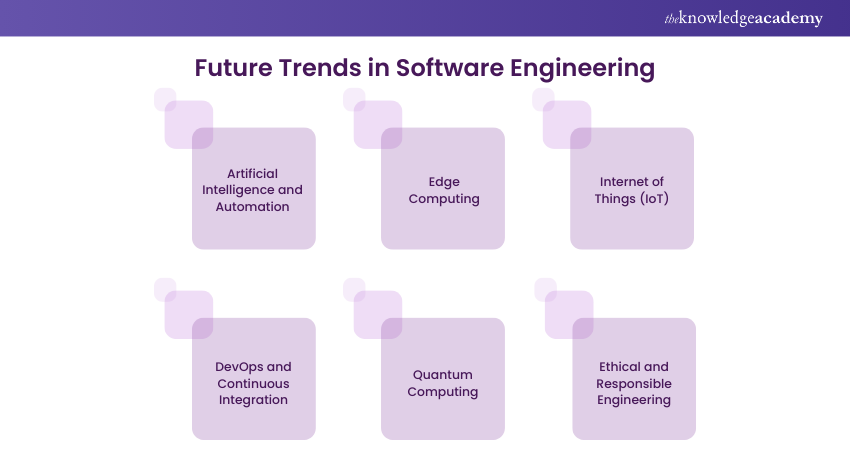We may not have the course you’re looking for. If you enquire or give us a call on +61 272026926 and speak to our training experts, we may still be able to help with your training requirements.
We ensure quality, budget-alignment, and timely delivery by our expert instructors.

In today’s digital age, Software Engineers are the masterminds behind technological progress, crafting everything from mobile apps to intricate systems. Their expertise fuels innovation and tackles complex challenges, leaving many curious about their true role.
As of 2023, there are an impressive 27.7 million Software Engineers globally, according to Statista. Dive into this blog to understand the question “What Does a Software Engineer Do?” and the daily responsibilities of a Software Engineer and discover the profound impact they have on technology and our world.
Table of Contents
1) What Does a Software Engineer Do?
2) Is Software Engineering a Good Career?
3) Tools and Technologies Used by Software Engineers
4) Soft Skills and Qualities of Successful Software Engineers
5) The Evolving Role of Software Engineers
6) Software Engineering Jobs and Salaries
7) Future Trends in Software Engineering
8) What is the Workplace of a Software Engineer like?
9) Conclusion
What Does a Software Engineer Do?
A Software Engineer is responsible for designing, developing, and maintaining software applications, platforms, and solutions. They have expertise in Programming Languages, frameworks, and algorithms, enabling them to translate conceptual ideas into functional code.
These professionals can debug and troubleshoot issues to ensure seamless software functionality. They often collaborate with multidisciplinary teams to align software with user needs and project goals.
Moreover, continuous learning and adaptation are necessary to their role. They stay updated on the new technologies and methodologies to steer innovation and shape the digital landscape.
Key Responsibilities of Software Engineer
Now, let’s explore What Does a Software Engineer Do and their key responsibilities:

a) Designing and Developing Software:
Software Engineers design software applications to meet specific customer requirements. They analyse user needs, establish system specifications, and translate them into functional code. It includes selecting the right programming languages, frameworks, and libraries for robust, scalable, and reliable software.
b) Problem-solving and Debugging:
Software Engineers are proficient problem-solvers. They identify, analyse, and rectify issues during development. Additionally, they debug code to ensure software functions are as intended and free from glitches that could impact User Experience (UX).
c) Collaborating With Teams:
Teamwork is central to Software Engineering. Engineers work together with developers, designers, Project Managers, and Stakeholders to design whole software solutions. This teamwork highlights the importance of Effective Communication and alignment of goals.
d) Continuous Learning and Skill Development:
Software Engineers engage in continuous learning to stay competitive. They keep pace with evolving tools, languages, and methodologies. This proactive approach enables adaptation to emerging trends and technologies.
e) Ensuring Code Quality:
Software Engineers write clean, maintainable, and efficient code, following the coding standards and best practices. Quality code reduces bugs, facilitates collaboration, and simplifies future maintenance.
f) Testing and Quality Assurance:
Engineers conduct rigorous testing to ensure software functionality, performance, and security. They design and execute test cases, automate testing processes, and address issues before deployment.
g) Managing Project Lifecycle:
From requirement analysis to deployment and maintenance, they participate in all stages throughout the Software Development Lifecycle. They collaborate with stakeholders, refining project requirements to shape the final product.
Is Software Engineering a Good Career?
Yes, Software Engineer is a great career option if you possess good analytical and problem-solving abilities. The need for software developers is growing at a fast pace, particularly much faster than the national average due to advancements in technology.
Software Engineering offers opportunities across various sectors since almost all businesses rely on software. Whether your interest is in finance, entertainment, sports, or real estate, numerous opportunities await.
Software Engineering also offers flexibility in work locations, including remote opportunities with companies in different states or countries. As long as deadlines and project completion are met, distance is not a limitation.
Enhance your skills with our Software Design and Architecture Training and master the art of creating robust and efficient systems.
Tools and Technologies Used by Software Engineers
Software Engineers use a range of tools and technologies to streamline their work, boosting productivity and crafting robust, efficient software solutions. These essential tools include programming languages, Integrated Development Environments (IDEs), version control systems, testing frameworks, and deployment tools.

a) Programming Languages: Programming languages are the stepping stones of Software Development. Software Engineers choose languages based on project requirements and their expertise. Popular languages like Python, Java, JavaScript, C++, and Ruby are various tools for creating various applications.
b) Integrated Development Environments (IDEs): IDEs are centralised platforms that provide a complete environment for Software Development. They combine code editors, debugging tools, and features for version control. Some examples are Visual Studio Code, IntelliJ IDEA, Eclipse, and PyCharm. IDEs help increase efficiency by providing code suggestions, instant error validation, and seamless integration with Version Control Systems.
c) Version Control Systems: VCS help manage alterations to code over time, promoting teamwork and monitoring changes. Git is a VCS that is distributed in nature. It is utilised within the Software Engineering field. GitHub and GitLab offer storage spaces for code, enabling collaboration and Project Management.
d) Testing Frameworks: Quality assurance is a crucial part of Software Development in testing frameworks. JUnit automates testing processes for Java, pytest for Python, Jasmine for JavaScript, and NUnit for .NET are some of the testing frameworks. These platforms allow developers to create and run tests for code functionality, catching potential issues early in the development process.
e) Continuous Integration/Continuous Deployment (CI/CD) Tools: CI/CD tools automate the integration, testing, and deployment of code changes. Some of the popular CI/CD tools are Jenkins, Travis CI, CircleCI, and GitLab CI/CD. They help ensure code quality and streamline the release process by automating testing, building, and deployment workflows.
f) Containerisation and Orchestration Tools: Containers, such as those managed by Docker, package applications and their dependencies in a consistent environment. Kubernetes is an orchestration tool that automates the deployment, scaling, and management of containerised applications. These tools enhance the portability, scalability, and reliability of software applications.
g) Package managers: Package managers make it easier to install, update, and manage software libraries and dependencies. NPM, pip, and Maven are tools that give users access to various open-source libraries and packages, such as Node Package Manager for JavaScript, pip for Python, and Maven for Java.
h) Code review and collaboration platforms: Code review platforms like Gerrit and Crucible facilitate collaborative code evaluation. They enable team members to provide feedback, identify bugs, and ensure code quality. Such platforms enhance code consistency and help maintain coding standards.
i) Documentation tools: Effective documentation is important for maintaining Software Projects. Tools like Javadoc (for Java), Sphinx (for Python), and JSDoc (for JavaScript) generate documentation from inline comments in code. This makes it easier to keep documentation up to date.
j) Monitoring and logging tools: Monitoring and logging tools such as Prometheus, Grafana, and ELK Stack (Elasticsearch, Logstash, Kibana) are essential for maintaining application health. They offer insights into application performance, error tracking, and user behaviour.
Code analysis and static analysis tools: Tools like SonarQube and Checkmarx perform code analysis and static analysis. They help identify code smells, vulnerabilities, and potential issues. This lets developers maintain high code quality and security.
Boost your skills with our Agile Software Development Training and harness the benefits of iterative and collaborative projects.
Soft Skills and Qualities of Successful Software Engineers
While technical prowess is a cornerstone of a Software Engineer's toolkit, possessing good Soft Skills and qualities is equally vital for achieving excellence in the field. Successful Software Engineers go beyond writing code; they navigate complex projects, collaborate effectively, and communicate with precision. Here are key Soft Skills and qualities that set them apart:
a) Problem-solving Attitude: Software Engineers are basically individuals who solve problems. They excel at breaking down complex problems, pinpointing underlying issues, and creating inventive answers. Having a mindset focused on solving problems promotes efficiency, creativity, and the skill to overcome challenges in coding, debugging, and system design.
b) Communication Skills: Effective communication bridges the gap between technical jargon and practical outcomes. Software Engineers interact with colleagues, clients, and stakeholders. Clear communication ensures that everyone is on the same page, fosters collaboration, and minimises misunderstandings that can lead to errors.
c) Adaptability and Continuous Learning: Adaptability is important In a constantly changing tech environment. Successful Software Engineers are open to learning new languages, frameworks, and methodologies. They stay current with industry trends, readily embracing emerging technologies to remain competitive.
d) Attention to Detail: Even a small mistake in Software Development can lead to major problems later on. Having careful attention to detail guarantees that the code is neat, free of bugs, and follows the best practices. Paying close attention to details is essential for developing sturdy, dependable, and easy-to-use software.
e) Team collaboration: Software development is rarely a solitary endeavour. Collaborating with cross-functional teams, including designers, Project Managers, and quality assurance experts, is integral to achieving success. Collaborative skills create seamless teamwork, knowledge sharing, and the production of well-rounded software solutions.
f) Leadership and Initiative: Even in technical positions, Leadership Qualities are still easily recognisable. Effective engineers display initiative, suggest ideas, and serve as role models. They take the lead in supporting new team members, providing guidance to colleagues, and promoting a positive workplace atmosphere.
g) Time management: Balancing multiple tasks and deadlines is a hallmark of Software Engineering. Effective Time Management ensures that projects progress smoothly, tasks are completed on schedule, and quality is not compromised under pressure.
In Software Engineering, having a blend of technical experience and exceptional Soft Skills is what propels professionals to greatness. These qualities enable Software Engineers to code efficiently and effectively. They also help them engage, innovate, and deliver solutions that make a tangible impact.
The Evolving Role of Software Engineers
The role of Software Engineers has experienced a remarkable transformation due to the latest advancements in technology, changing development practices, and evolving user needs. This evolution has redefined the scope of their work and also reshaped their responsibilities and impact on the digital landscape.
a) Agile and DevOps Practices: The traditional Waterfall approach to Software Development has given way to Agile Methodologies and DevOps practices. Software Engineers now work in iterative cycles, collaborating closely with cross-functional teams to deliver incremental updates and improvements. This shift focuses on rapid development, continuous integration, and shorter release cycles, allowing engineers to adapt to changing requirements swiftly.
b) Ethics and Responsible Engineering: As technology's influence on society grows, Software Engineers are assuming a more ethical stance. They are becoming increasingly aware of the ethical implications of their work. This includes ensuring that the software they develop respects user privacy, data security, and societal well-being. Responsible engineering is becoming an integral aspect of the Software Development process.
c) Remote and Distributed Work: The rise of remote work has transformed how Software Engineers operate. Collaborating across geographical boundaries has become the norm. Engineers are now challenged to communicate effectively, manage projects remotely, and navigate different time zones. This trend has accelerated due to the global shift brought about by the COVID-19 pandemic.
d) Continuous Learning and Adaptation: The tech landscape is in a constant state of flux. To stay relevant, Software Engineers must embrace continuous learning. The rapid emergence of new programming languages, frameworks, tools, and paradigms requires a commitment to updating skills. Engineers must continuously adapt to these evolving technologies.
e) Holistic Skill Set: Software Engineering role demands a broader skill set. Soft Skills like strong communication, problem-solving, and teamwork are essential for them. Engineers need to articulate complex technical concepts to non-technical stakeholders, foster collaboration, and adapt to dynamic team structures.
Software Engineering Jobs and Salaries
Software Engineering offers various job opportunities across many industries. This includes technology, finance, healthcare, and more. Their job roles and salaries vary based on several factors, such as experience, location, and industry. Let's take a look at some of the prominent job titles within the field and their salaries:
|
Job title |
Average salary in the UK |
|
Applications Developer |
£41,000 |
|
Systems Developer |
£44,8232 |
|
Mobile Develope |
£51,3463 |
|
Applications Architect |
£92,1964 |
|
Quality Assurance Analyst |
£43,4835 |
|
Database Administrator |
£44,0796 |
Source: Glassdoor
1) Applications Developer: These professionals specialise in designing and creating software applications tailored to meet specific user needs and requirements. Besides, they ensure functionality and user-friendliness in the applications they develop.
2) Systems Developer: These experts focus on designing and building complex software systems and frameworks. Moreover, they ensure seamless interaction between different components within the infrastructure of an organisation.
3) Mobile Developers: With the rise of mobile technology, these developers create applications for smartphones and tablets. They cater to the increasing demand for mobile solutions in today's digital landscape.
4) Applications Architects: These Architects design and oversee the overall structure and architecture of software applications. Moreover, they ensure scalability, efficiency, and adherence to best practices in application development.
5) Quality Assurance Analysts: Tasked with ensuring software reliability and performance, these Analysts rigorously test applications under various conditions. Besides, they identify and rectify defects to ensure the quality of the final product.
6) Database Administrators: These professionals manage and maintain databases storing an organisation's critical data. Additionally, they ensure data integrity, security, and accessibility while optimising database performance.
Future Trends in Software Engineering
Here are the key trends expected to drive the future of Software Engineering, refined and presented in pointers:

a) Artificial Intelligence (AI) and Automation:
a) AI-powered tools will revolutionise software development.
b) Streamlining coding, testing, and debugging processes.
c) Enhancing efficiency and accuracy.
b) Edge Computing:
a) Growing importance due to the proliferation of IoT devices.
b) Focus on developing solutions leveraging edge devices.
c) Optimising data processing and reducing latency.
c) Internet of Things (IoT):
a) Critical role in creating interconnected ecosystems.
b) Designing applications for seamless communication and control of smart devices.
d) DevOps and Continuous Integration:
a) Continued growth of the DevOps culture.
b) Integration of development and operations teams.
c) Standardisation of Continuous Integration and Continuous Delivery (CI/CD) pipelines.
e) Quantum Computing:
a) Exploration of quantum computing’s potential.
b) Solving complex problems previously computationally infeasible.
f) Ethical and Responsible Engineering:
a) Increased focus on ethical considerations in software development.
b) Creating responsible and secure software.
c) Respecting user privacy and societal values.
What is the Workplace of a Software Engineer Like?
The workplace of a Software Engineer can vary depending on the company and the project. Generally, Software Engineers work in corporate offices, startups, or remote locations.
In corporate offices, especially at larger companies, engineers often find themselves in professional environments with modern workstations, meeting rooms, and amenities like on-site cafeterias. These offices might be located in urban or suburban areas, with workspaces ranging from individual cubicles to open-plan areas, depending on the company's culture.
Startups offer a different environment, typically characterised by a more relaxed and informal atmosphere. These settings often emphasise collaboration and creativity and may be found in shared office spaces, co-working facilities, or dedicated incubators.
Remote work has gained popularity, especially following the COVID-19 pandemic. Remote Software Engineers can work from anywhere with a reliable internet connection, including home offices or shared workspaces, based on personal preference and employer policies.
Regardless of their location, Software Engineers usually spend substantial time at a computer, writing code, debugging software, and testing applications. They may work long hours and be on call during evenings and weekends. Despite these demands, the role offers opportunities to work on innovative projects, collaborate with talented professionals, and make a significant impact in the tech industry.
Conclusion
Software Engineers are the driving force behind the digital transformation of our world. Their diverse roles, skills, and responsibilities shape the technologies we use daily. From designing applications to solving intricate problems, Software Engineers contribute to the continuous evolution of technology and innovation. Hope this blog has helped answer your questions about “What Does a Software Engineer Do?” and set you on your path.
Unlock your potential in Software Engineering with our comprehensive Software Engineering Training - Sign up now!
Frequently Asked Questions

While specific requirements may vary, most Software Engineer positions require a bachelor's degree in computer science, Software Engineering, or a related field. Robust programming skills, knowledge of Software Development methodologies, and experience with relevant tools and technologies are also essential.

Software Engineers typically work on various projects. This includes developing applications, creating and maintaining software systems, building websites, and designing algorithms. They also work on integrating APIs, enhancing user interfaces, and implementing security measures, all tailored to meet user needs and business goals.

The Knowledge Academy takes global learning to new heights, offering over 30,000 online courses across 490+ locations in 220 countries. This expansive reach ensures accessibility and convenience for learners worldwide.
Alongside our diverse Online Course Catalogue, encompassing 17 major categories, we go the extra mile by providing a plethora of free educational Online Resources like News updates, Blogs, videos, webinars, and interview questions. By tailoring learning experiences further, professionals can maximise value with customisable Course Bundles of TKA.

The Knowledge Academy’s Knowledge Pass, a prepaid voucher, adds another layer of flexibility, allowing course bookings over a 12-month period. Join us on a journey where education knows no bounds.

The Knowledge Academy offers various Software Engineering Courses, including Software Development Lifecycle Training, Software Design and Architecture Training and Agile Software Development Training. These courses cater to different skill levels, providing comprehensive insights into Software Engineering methodologies.
Our Programming & DevOps Blogs cover a range of topics related to Software Engineering, offering valuable resources, best practices, and industry insights. Whether you are a beginner or looking to advance your Software Engineering skills, The Knowledge Academy's diverse courses and informative blogs have you covered.
Upcoming Programming & DevOps Resources Batches & Dates
Date
 Systems Engineering Training
Systems Engineering Training
Fri 28th Mar 2025
Fri 23rd May 2025
Fri 4th Jul 2025
Fri 5th Sep 2025
Fri 24th Oct 2025







 Top Rated Course
Top Rated Course



 If you wish to make any changes to your course, please
If you wish to make any changes to your course, please


